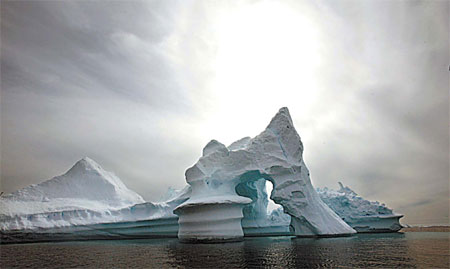Progress comes at a cost, but all is not lost yet
Updated: 2007-10-26 07:14
 |
|
An iceberg melts off Ammassalik Island in eastern Greenland in this July19, 2007, photograph. Icebergs are melting in the poles and glaciers on mountains because of global warming. [AP] |
The well being of billions of people in the developing world is at risk, simply because it has failed to remedy "the relatively simple" problems that have been tackled elsewhere, says the report. Ecosystems and human health in the region continue to deteriorate because of environmental degradation and loss of natural resources driven by population growth and rapid economic development.
The warning is the latest in a series on the global environment outlook released by the UN Environment Programme (UNEP). Despite the bleak picture, the UNEP yet again says it doesn't want to present a "dark and gloomy scenario". Rather, it is a call to arms, for people to take more stringent action.
UNEP Executive Director Achim Steiner says that in the past two decades, the world's response to environmental issues has at times been "courageous and inspiring". But all too often it has been "slow and at a pace and scale that fails to respond to the magnitude of the challenges".
Progress has been achieved in cutting the production of ozone-layer damaging chemicals by 95 percent and creation of a greenhouse gas emission reduction treaty.
But some old issues remain and new ones are emerging: from the rapid rise of oxygen "dead zones" in the oceans, to the resurgence of new and old diseases linked partly to environmental degradation. The report emphasizes the potential impact of climate change, which is likely result in more severe droughts and floods. "The threat is now so urgent that large cuts in greenhouse gases by mid-century are needed," it says.
As a "global priority", climate change demands political will and leadership, says UNEP. Yet it finds "a remarkable lack of urgency", and a "woefully inadequate" global response. One such example is some highly polluting countries' refusal to sign the Kyoto Protocol, which among other things requires signatory nations to reduce emissions of greenhouse gases. The report says: "Some industrial sectors that were unfavorable to the Protocol managed successfully to undermine the political will to ratify it."
A major meeting is expected to be held in Indonesia in December to begin discussions on a post-Kyoto Protocol treaty.
The Asia and the Pacific region, which is home to 60 percent of the world's population, is making "remarkable progress" in reducing poverty, says the UN report. The region's environmental protection measures, energy efficiency and drinking water provision have improved too in the past decade. Several countries have already achieved many of the Millennium Development Goal (MDG) targets and have set themselves new and more demanding goals, called MDG Plus.
But progress has come at a high cost. The report says: "Increases in consumption have contributed to the exponential growth in existing environmental problems. Serious challenges remain, including urban air quality, fresh water stress, agricultural land use (a threat to food security) and increased waste. The illegal traffic in electronic and hazardous waste is a new challenge affecting human health and the environment."
Environmental and economic policies have not been fully integrated, and that is a major obstacle in the path of an effective system of environmental management. The report says ecosystems and human health in Asia and the Pacific region continue to deteriorate, while population growth and rapid economic development causes more environmental damage and depletes natural resources further.
The air quality in the region is suffering serious damage because of growing energy needs and the "exploding" growth in the number of vehicles. In the 1990s, the number of cars and motorcycles in China and India rose by more than 10 percent a year.
Haze pollution from forest fires in Southeast Asia has worsened matters. Excessive use of surface and underground water, industrial pollution, and inefficient use of fresh water are responsible for the water crisis. There are also indications of unprecedented glacier retreats in the Himalayan-Hindukush region.
Southeast Asian countries have earmarked 14.8 percent of their land for protection, above the world average of 12 percent for 2003. But elsewhere in the Asia and the Pacific region less than 10 per cent of land is protected.
Land sharks and the urbanization drive have caused arable land to shrink throughout the region, even though some countries appear to have taken counter-measures such as substituting new arable land for the degraded area.
The region has been the fastest developing in the world since the past two decades, imposing enormous pressure on the ecosystems such as mangrove forests and coral reefs. The newfound affluence of the region's peoples and their new lifestyles have changed consumption patterns, generating large quantities of waste. Unsanitary landfills contaminating the soil and groundwater are major causes for concern.
More than 90 percent of the 20-50 million tons of electronic waste that is generated every year across the globe ends up in Bangladesh, China, India, Myanmar and Pakistan. And Asian workers reportedly use "obsolete technologies to process 21st century wastes". Effective waste management strategies and systems are either completely lacking or else inadequate in many countries in the region, posing a serious threat to human and environmental health.
But the report also says technology can help reduce people's vulnerability. Humanity's future will be determined largely by the decisions individuals and society take now. "Our common future depends on our actions today, not tomorrow or some time in the future."
|
|
|
||
|
||
|
|
|
|